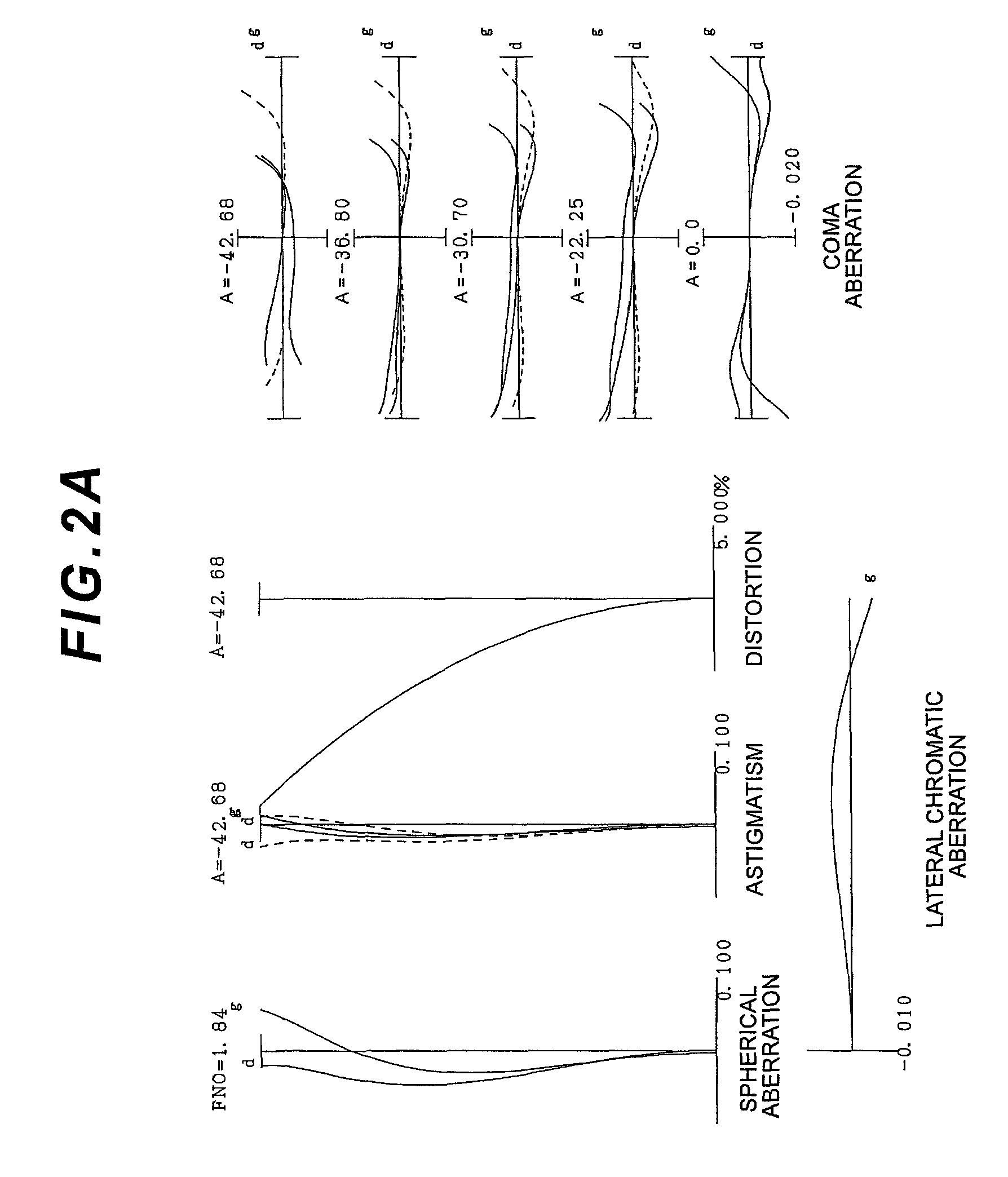Zoom lens, optical apparatus and method for manufacturing zoom lens
a technology of optical apparatus and zoom lens, which is applied in the direction of optics, optical elements, instruments, etc., can solve the problems that the conventional zoom lens does not meet the ideal optical performance, and achieve the effect of high zoom ratio, ideal optical performance and large aperture ratio
- Summary
- Abstract
- Description
- Claims
- Application Information
AI Technical Summary
Benefits of technology
Problems solved by technology
Method used
Image
Examples
example 1
[0070]Each example of the present invention will now be described with reference to the drawings. Example 1 will be described with reference to FIG. 1, FIG. 2 and Table 1. FIG. 1A shows a lens configuration of the zoom lens according to Example 1 in the wide-angle end state, FIG. 1B shows the lens configuration in the intermediate focal length state, and FIG. 1C shows the lens configuration in the telephoto end state. The zoom lens ZL according to Example 1 comprises, in order from an object, a first lens group G1 having negative refractive power as a whole, a second lens group G2 having positive refractive power as a whole, and a third lens group G3 having positive refractive power as a whole. Upon zooming from the wide-angle end state to the telephoto end state, the first lens group G1 and the second lens group G2 move along the optical axis respectively, and the third lens group G3 is fixed on the optical axis, so that the distance between the first lens group G1 and the second l...
example 2
[0081]Example 2 will be described with reference to FIG. 3, FIG. 4 and Table 2. FIG. 3A shows a lens configuration of the zoom lens according to Example 2 in the wide-angle end state, FIG. 3B shows the lens configuration in the intermediate focal length state, and FIG. 3C shows the lens configuration in the telephoto end state. The zoom lens of Example 2 has a same configuration as the zoom lens of Example 1, except for a part of the shape of the first lens group G1, therefore each component the same as Example 1 is denoted with the same reference symbol, for which detailed description is omitted. The first lens group G1 in Example 2 includes, in order from an object, a negative meniscus lens L11 having a convex surface facing the object positive and a positive meniscus lens L12 having a convex surface facing the object, and the lens surface facing the image plane I in the negative meniscus lens L11 is aspherical.
[0082]Table 2 shows each data of Example 2. The surface numbers 1 to 1...
example 3
[0086]Example 3 will be described with reference to FIG. 5, FIG. 6 and Table 3. FIG. 5A shows a lens configuration of the zoom lens according to Example 3 in the wide-angle end state, FIG. 5B shows the lens configuration in the intermediate focal length state, and FIG. 5C shows the lens configuration in the telephoto end state. The zoom lens of Example 3 has a same configuration as the zoom lens of Example 1, except for a part of the shape of the second lens group G2, therefore each component the same as Example 1 is denoted with the same reference symbol, for which detailed description is omitted. The second lens group G2 in Example 2 includes, in order from an object, a first positive lens L21 having a biconvex positive lens, a second positive lens L22 having a biconvex positive lens, a biconcave negative lens L23, a third positive lens having a biconvex positive lens, and both surfaces of the first positive lens L21 are aspherical. Also, the second positive lens L22 and the negat...
PUM
 Login to View More
Login to View More Abstract
Description
Claims
Application Information
 Login to View More
Login to View More - R&D
- Intellectual Property
- Life Sciences
- Materials
- Tech Scout
- Unparalleled Data Quality
- Higher Quality Content
- 60% Fewer Hallucinations
Browse by: Latest US Patents, China's latest patents, Technical Efficacy Thesaurus, Application Domain, Technology Topic, Popular Technical Reports.
© 2025 PatSnap. All rights reserved.Legal|Privacy policy|Modern Slavery Act Transparency Statement|Sitemap|About US| Contact US: help@patsnap.com



